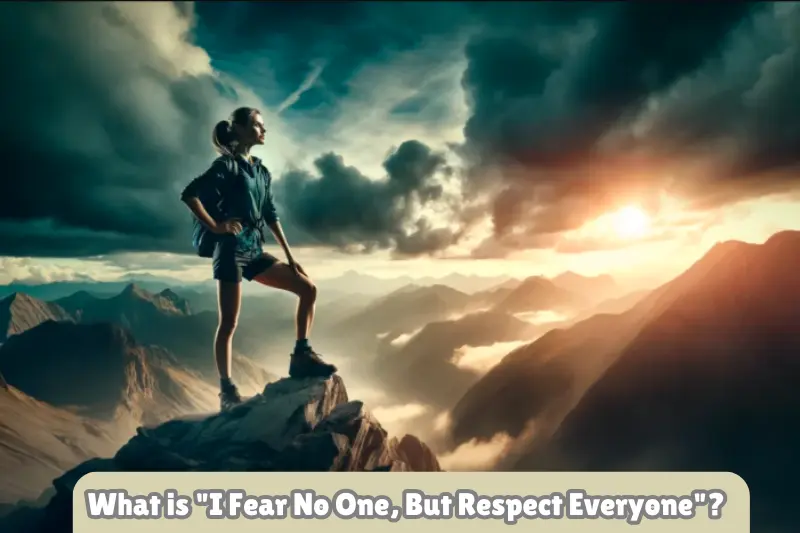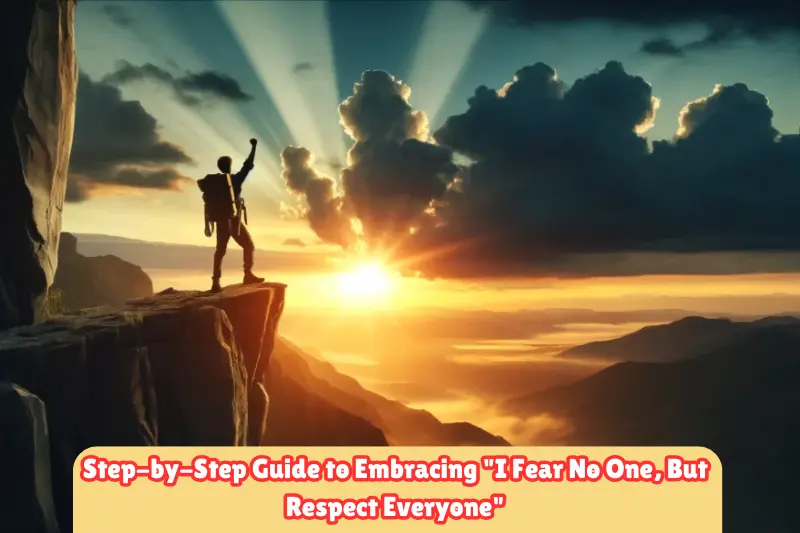Introduction
In life, we often face challenges that test our strength and character. Have you ever heard the saying, i fear no one, but respect everyone. – tymoff This powerful quote by Tymoff captures an important message about how we can approach the world around us. It tells us that we should stand tall and be confident in ourselves, but also treat others with kindness and respect.
This phrase encourages us to be fearless when pursuing our dreams and standing up for what we believe in. At the same time, it reminds us to value and acknowledge the worth of everyone we meet, no matter their background or opinions. By finding a balance between being brave and being respectful, we can build stronger relationships and create a more positive environment for ourselves and those around us.
In this blog post, we’ll explore what this quote really means, why it matters, and how we can apply it in our daily lives. Let’s dive in!
What is “I Fear No One, But Respect Everyone”?

The phrase “I fear no one, but respect everyone,” as stated by Tymoff, embodies a philosophy that encourages both confidence and humility. Let’s break it down into two key parts to understand its deeper meaning.
Fearlessness
The first part of the phrase, “I fear no one,” emphasizes the importance of having courage and self-assurance. It encourages individuals to confront challenges head-on without being intimidated by others. This mindset fosters resilience, enabling people to pursue their goals and stand firm in their beliefs. It’s about embracing who you are and not allowing fear to hold you back. When you fear no one, you empower yourself to take risks, speak up, and advocate for what you believe in, creating a sense of personal strength.
Respect for Everyone
The second part, “but respect everyone,” highlights the necessity of showing kindness and consideration to others. This part of the phrase reminds us that, while it’s important to be confident and assertive, we should also treat others with dignity and respect, regardless of their background or beliefs. By valuing the perspectives and experiences of others, we create a more inclusive environment that fosters understanding and cooperation.
The Balance
Together, these two concepts form a powerful balance. Being fearless doesn’t mean disregarding the feelings or rights of others. Instead, it’s about standing up for yourself while simultaneously acknowledging and respecting the worth of those around you. This balance can lead to healthier relationships, better communication, and a stronger sense of community.
In essence, “I fear no one, but respect everyone” serves as a guiding principle for how to navigate life with confidence and grace. It encourages us to be strong and assertive while fostering an atmosphere of respect and understanding in our interactions with others.
You May Also Like It
Trendzguruji.me – Computer, Cyber, Awareness, SEO, Health & Beauty Guide
TrendzGuruji.me Cyber Insights Hub
“What’s Up with Emerald Gems? Let’s Talk
Why is “I Fear No One, But Respect Everyone” Important?
The philosophy behind “I fear no one, but respect everyone” is significant for various reasons. It not only shapes our personal growth but also influences our interactions with others and the communities we live in. Here are some key points highlighting its importance:
Empowerment and Confidence
- Overcoming Fear: Encourages individuals to confront their fears, leading to personal empowerment.
- Self-Assurance: Fosters a sense of confidence that enables people to express themselves freely and pursue their goals.
Fostering Respectful Relationships
- Building Trust: Encourages mutual respect, which is essential for building trust in relationships, both personal and professional.
- Effective Communication: Promotes open and honest communication, leading to better understanding and fewer conflicts.
Encouraging Inclusivity
- Valuing Diversity: Encourages individuals to appreciate different perspectives and backgrounds, fostering an inclusive environment.
- Creating Harmony: Helps to reduce tensions and conflicts by promoting respect among diverse groups.
Personal and Social Growth
- Character Development: Cultivates qualities like humility, empathy, and compassion, which are vital for personal growth.
- Community Building: Contributes to a sense of community by promoting values that encourage cooperation and understanding.
Promoting Resilience
- Coping with Challenges: Encourages individuals to face challenges without fear, making them more resilient in difficult situations.
- Positive Mindset: A positive outlook on oneself and others fosters a supportive environment that can help individuals navigate life’s ups and downs.
Role Modeling
- Inspiring Others: When individuals embody this philosophy, they set a positive example for others, inspiring them to adopt similar attitudes.
- Creating Leaders: Encourages the development of leaders who prioritize respect and fearlessness in their interactions, benefiting organizations and communities.
Step-by-Step Guide to Embracing “I Fear No One, But Respect Everyone”

Step 1: Self-Reflection
- Assess Your Fears: Take time to identify what fears hold you back in various aspects of your life, whether personal, professional, or social.
- Understand Your Values: Reflect on your core values and beliefs. Knowing what you stand for will strengthen your confidence and help you articulate your perspective.
Step 2: Build Confidence
- Set Small Goals: Start with achievable goals that push you slightly out of your comfort zone. Celebrate your successes, no matter how small.
- Practice Positive Self-Talk: Replace negative thoughts with affirmations that reinforce your strengths and capabilities.
Step 3: Develop Respect for Others
- Practice Empathy: Make an effort to understand others’ feelings and perspectives. This can be done through active listening and engaging in conversations.
- Acknowledge Differences: Recognize that everyone has unique experiences and backgrounds. Embrace these differences instead of judging them.
Step 4: Cultivate Open Communication
- Express Yourself: Share your thoughts and feelings openly with others while remaining respectful. Use “I” statements to express your views without sounding confrontational.
- Encourage Dialogue: Invite others to share their perspectives, fostering an environment where everyone feels valued and heard.
Step 5: Practice Mutual Respect
- Set Boundaries: Respect your own boundaries and those of others. Clearly communicate what is acceptable and what isn’t.
- Show Appreciation: Acknowledge the contributions and qualities of others. Simple gestures of appreciation can go a long way in fostering respect.
Step 6: Face Challenges with Courage
- Embrace Difficult Situations: When faced with challenges or conflicts, approach them with a fearless mindset. Analyze the situation and determine the best course of action.
- Stay Calm Under Pressure: Practice techniques such as deep breathing or mindfulness to maintain composure when situations become stressful.
Step 7: Model the Philosophy
- Lead by Example: Demonstrate the principles of fearlessness and respect in your daily life. Show others how it’s done through your actions and attitude.
- Encourage Others: Inspire friends, family, and colleagues to adopt this philosophy. Share your experiences and the benefits you’ve gained from embracing it.
Step 8: Reflect and Adjust
- Regularly Reflect: Periodically evaluate how well you’re embodying this philosophy. Consider what’s working and what needs adjustment.
- Stay Open to Learning: Be willing to adapt and grow. Learning from experiences and feedback will help you refine your approach over time.
Advantages and Disadvantages of “I Fear No One, But Respect Everyone”
Advantages
| Empowerment and Confidence Increased Self-Esteem: Embracing this philosophy boosts self-confidence, encouraging individuals to assert themselves and take risks. Resilience: Fearlessness helps people face challenges head-on, leading to personal growth and resilience. |
| Fostering Healthy Relationships Mutual Respect: This mindset promotes an environment of respect, strengthening interpersonal relationships and building trust. Open Communication: Encourages honest conversations, allowing individuals to express themselves freely and resolve conflicts effectively. |
| Encouraging Inclusivity Valuing Diversity: Respect for everyone fosters appreciation for diverse perspectives, enhancing teamwork and collaboration. Social Harmony: Reduces tension and conflict, contributing to a more harmonious community. |
| Character Development Humility and Empathy: Encourages individuals to practice humility and empathy, leading to personal growth and better social interactions. Role Modeling: Those who embody this philosophy can inspire others to adopt similar attitudes, promoting a culture of respect. |
| Promoting Personal Accountability Self-Reflection: Encourages individuals to assess their behaviors and motivations, fostering personal accountability and growth. Better Decision-Making: Fearlessness can lead to clearer decision-making, as individuals are more likely to stand by their values and beliefs. |
Disadvantages
| Misinterpretation of Fearlessness Potential Arrogance: Some may misinterpret fearlessness as a lack of humility, leading to arrogant behavior or disregard for others’ feelings. Confrontational Attitudes: A fearlessness that is not tempered by respect can lead to unnecessary conflicts and confrontations. |
| Balancing Respect and Assertiveness Challenges in Communication: Striking a balance between being assertive and respectful can be difficult, leading to misunderstandings. Over-Respecting: In some situations, excessive respect might hinder assertiveness, causing individuals to avoid necessary confrontations or assert their needs. |
| Vulnerability to Manipulation Exploitation of Kindness: Those who respect everyone may become vulnerable to manipulation or exploitation by individuals who take advantage of their kindness. Difficulty Setting Boundaries: A strong emphasis on respect might make it hard for some individuals to set and enforce personal boundaries. |
| Resistance from Others Backlash: Not everyone may appreciate or reciprocate this philosophy, leading to potential backlash or negativity from those who do not share the same values. Conflict with Aggressive Individuals: Fearlessness might attract conflict with individuals who respond aggressively to assertiveness or challenge. |
| Overwhelming Expectations Pressure to Maintain Attitude: Continuously embodying this philosophy can create pressure to always be fearless and respectful, which may lead to burnout. Fear of Failure: Individuals may fear they are failing if they struggle to embody this philosophy consistently, leading to self-doubt. |
Common FAQs About “I Fear No One, But Respect Everyone”
What does “I fear no one, but respect everyone” mean?
Why is this philosophy important?
How can I apply this mindset in my daily life?
Reflecting on your fears and working to overcome them.
Practicing open and respectful communication with others.
Acknowledging and appreciating the different perspectives around you.
Standing up for your beliefs while treating others with kindness.
What are the benefits of living by this philosophy?
Are there any downsides to this mindset?
How can I overcome challenges when applying this mindset?
Practice self-reflection to understand your reactions and behaviors.
Seek feedback from trusted friends or mentors about your communication style.
Be open to learning from your experiences and adjusting your approach as needed.
Can this philosophy help in professional settings?
What if others don’t respect me in return?
How can I teach this philosophy to others?
Is this philosophy applicable in all situations?
Conclusion
In summary, the phrase “I fear no one, but respect everyone” is a powerful reminder to balance confidence and humility. By embracing this mindset, you can face challenges head-on while treating others with kindness and respect. This approach not only empowers you but also creates a positive environment for those around you. Remember, being fearless doesn’t mean disregarding others; it means standing strong while valuing the unique experiences and perspectives of everyone you encounter. By living this philosophy, you can foster better relationships and contribute to a more inclusive and supportive community.
Bonus Points
Practice Mindfulness:
- Take a moment to pause and reflect before responding in challenging situations. Mindfulness can help you remain calm and respectful, even under pressure.
Seek Feedback:
- Regularly ask for feedback from friends, family, or colleagues about how you express fearlessness and respect. This can help you improve your approach and build stronger connections.
Engage in Self-Care:
- Taking care of your physical and mental well-being can boost your confidence and ability to respect others. Engage in activities that nurture your body and mind, such as exercise, meditation, or hobbies you enjoy.
Celebrate Differences:
- Make a conscious effort to learn about and appreciate diverse cultures and perspectives. Attend events or read about different backgrounds to enhance your understanding and respect for others.
Lead with Kindness:
- In your daily interactions, prioritize kindness. A simple smile or greeting can go a long way in making others feel respected and valued.
Use Assertive Language:
- When expressing your thoughts or feelings, use clear and assertive language. This helps you communicate fearlessly while still being respectful to others.
Encourage Collaboration:
- Foster a collaborative spirit in your relationships by seeking input and ideas from others. This shows respect for their contributions and strengthens your bond.
Reflect on Experiences:
- After challenging interactions, take time to reflect on what went well and what could be improved. This practice can help you grow and adapt your approach over time.
Set Realistic Expectations:
- Understand that not everyone will respond positively to your approach. Focus on being consistent in your behavior, regardless of others’ reactions.
Share Your Journey:
- Talk about your experiences and how this philosophy has impacted your life. Sharing your journey can inspire others to adopt similar principles and create a ripple effect of positivity.
You May Also Like It!
Instagram Par Follower Kaise Badhaye With Can Follow Website – Veganov Trichy
1000+ Free Instagram Story Views In 2024– Veganov Trichy
How To Increase Followers On Instagram With TakipciGir New Update 2024
